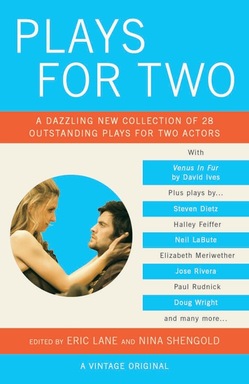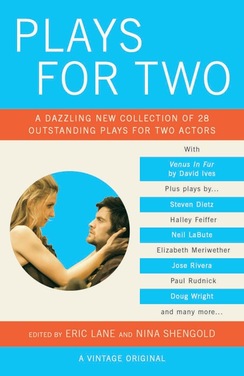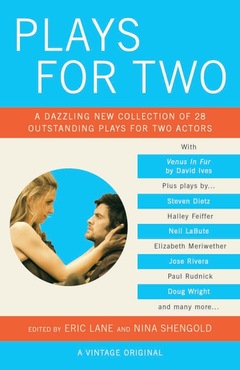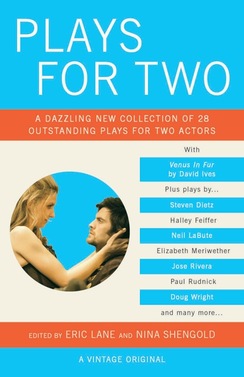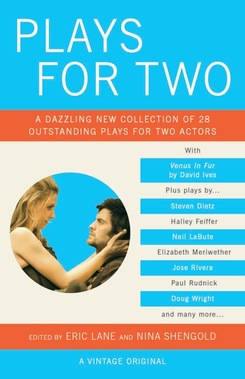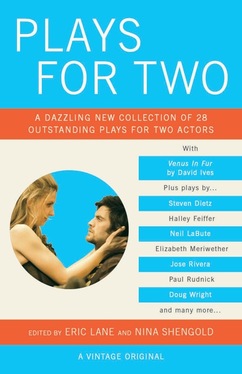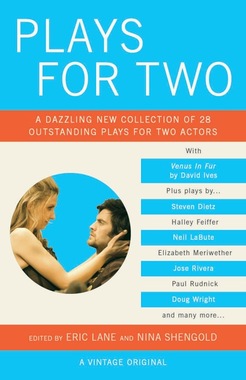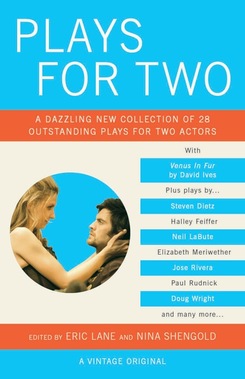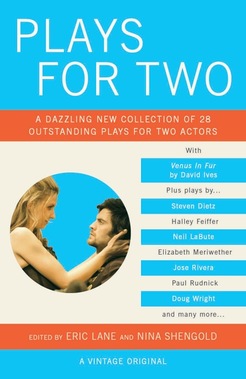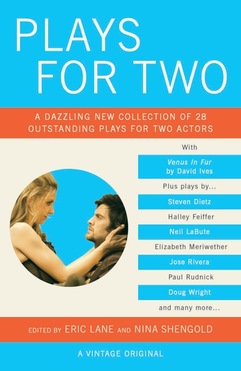|
Plays for Two is a unique anthology of twenty-eight terrific plays for two actors, by a mix of celebrated playwrights and cutting-edge new voices. I had the pleasure of speaking with playwright Cori Thomas about her play, Waking Up, her advice for emerging playwrights, and upcoming work. 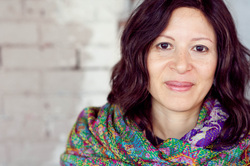 JACQUELINE LAWTON: Why did you decide to get into theatre? Was there someone or a particular show that inspired you? CORI THOMAS: When I was in the 6th grade I saw a highschool production of The Glass Menagerie. I was pretty shy and felt awkward and I felt like I was seeing myself on stage. I couldn't believe how involved I became in that story and just wanted to be a psrt of that world of escape and being moved. Being able to move people the way I was moved. JL: Tell me a little bit about your writing process. Do you have any writing rituals? Do you write in the same place or in different places? CT: I don't write from a plan or outline. I rarely write a play knowing the plot or story even. I usually just start at the beginning and let it take me where it wants to. If I had no day job, I would treat writing as a job and wake up and write all day. I have gone on writers retreats and had times when I was not working and had no problem doing that. Because I do have a day job, I write when I can. JL: Can you tell me about the play that’s being published in Plays for Two? CT: Waking Up is about 2 women one in Africa, one in The USA who both end up with breast cancer. They don't know each other and never meet each other. Their experiences are parallell very different and very alike in surprising ways. JL: What excited you about being a part of this anthology? CT: It is always exciting to be published. I was thrilled to be invited to be a part of the anthology. JL: What advice do you have for up-and-coming playwrights? CT: Write as much as you can, and stay out of your own way. Don't judge what you write. Certainly not while you're writing. Try to finish a draft before you start fiddling with it. And better yet try to get it read before beginning rewrites. Expect to rewrite! Join a writing group and listen to fellow playwrights read it aloud. Or if you have actor friends ask them to read it for you and feed them dinner. It is invaluable to hear your work aloud. Plays are meant to be acted. Don't give up. Keep at it. When you finish one play, start another. Don't wait for anything. JL: What next for you? Where can we follow your work? CT: I have a production of a full length play coming up end of May at Ensemble Studio Theatre. It's a co-production with Page 73 Productions. The title is WHEN JANUARY FEELS LIKE SUMMER it was at the Sundance Theatre Lab and its World Premiere was at City Theatre Company in Pittsburgh. I am very excited to have this play seen in New York. It's a very "New York" play. About the PlaywrightCori Thomas is a playwright and actress. Plays: When January Feels Like Summer; Pa’s Hat; My Secret Language of Wishes; Akosua Means Sunday;The Princess, The Breast, and, The Lizard; The Unusual Love Life of Bedbugs and Other Creatures; Waking Up; His Daddy; our lives, our fortunes, and our sacred honor. Thomas’ plays have been developed and produced at Sundance Theatre Lab, Goodman Theatre, City Theatre Company (Pittsburgh), Page 73, Rockefeller Brothers Fund, Playwrights Horizons, Lark Play Development Center, The Ensemble Studio Theatre, Going To The River, Pillsbury House Theatre, Mixed Blood Theatre, Penumbra Theatre, Passage Theatre, The Playwrights Realm, New Federal Theatre, New Georges, The Black Rep (St. Louis), The New Black Fest, and Queens Theatre in the Park. She has been commissioned by South Coast Rep Theatre, Sloan Foundation/EST, NYSCA/EST, Pillsbury House Theatre. She has received a grant from the Jerome Foundation and has been a Sundance Institute Fellow and a MacDowell Fellow. Publications: (Smith and Krauss Best short plays 2010) His Daddy. Awards and Honors: Edgerton Foundation New Play Award, 2008 Sundance Theatre Lab Fellow, and 2011 American Theatre Critics Association Osborn Award ; Theodore Ward Prize About the Anthology
1 Comment
Plays for Two is a unique anthology of twenty-eight terrific plays for two actors, by a mix of celebrated playwrights and cutting-edge new voices. I had the pleasure of speaking with playwright Edwin Sanchez about what inspires him to write, his new novel, and his play, Bea & May. 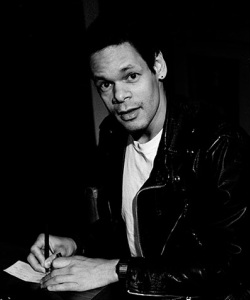 JACQUELINE LAWTON: Why did you decide to get into theatre? Was there someone or a particular show that inspired you? EDWIN SANCHEZ: I had just done my first play as an actor, The Me Nobody Knows, and I really fell in love with the sense of community I found. When I got to New York I found the roles for Latino actors to be very limited, gang members, drug dealers, so I decided I would write plays that would reflect the world as I saw it. I have always been surrounded by a real mix of people and I wanted my characters and my plays to reflect that. JL: Tell me a little bit about your writing process. Do you have any writing rituals? Do you write in the same place or in different places? ES: I really don't have a ritual. The only thing that is a must for me is that I have to write the first draft in long hand. I love the idea of a character coming through me onto the paper. JL: Can you tell me about the play that’s being published in Plays for Two? ES: Bea & May is a love story between two women. We open on the wedding of one of them and come to discover they will not wind up together. JL: What excited you about being a part of this anthology? ES: Eric and Nina have included my work in a prior anthology so I’m very happy to be back. What’s so important about it is that short plays can just disappear into the ether. These anthologies give them a permanence that is really exciting and gratifying. JL: What advice do you have for up-and-coming playwrights? ES: Don’t talk your play, write it. Don’t tell everyone what the story is, write it. It’s the sitting down and doing the work that matters. Also find out what works best for you. Silence, music, solitude. JL: What next for you? Where can we follow your work? ES: I have a website, edwinsanchez-writer.com and I’ve just finished my first novel, Diary of a Puerto Rican Demigod, which should be available soon. I continue to write and I teach at ESPA at Primary Stages in NY. About the PlaywrightWinner of National Latino Playwriting Award for LA BELLA FAMILIA, Edwin Sanchez's recent productions include TRAFFICKING IN BROKEN HEARTS at the Celebration Theatre in Los Angeles as well as the world premiere of my romantic comedy I’LL TAKE ROMANCE at the Evolution Theatre in Ohio. Other productions include, DIOSA, produced by Hartford Stage after a successful workshop by New York Stage and Film, TRAFFICKING IN BROKEN HEARTS at the Atlantic Theater in New York, UNMERCIFUL GOOD FORTUNE at the Intar Theater in New York, ICARUS produced by Fourth Unity in New York, Actors Theater of Louisville as part of their Humana Festival, and San Jose Rep in California. My play BAREFOOT BOY WITH SHOES ON was produced by Primary Stages in New York and was selected by the Eugene O’Neill Playwrights Conference to represent the National Playwrights Conference at the Schelykovo Playwrights Seminar in Russia. My work has been produced regionally throughout the United States as well as Brazil and Switzerland. Among my awards are the Kennedy Center Fund for New American Plays (CLEAN), three New York Foundation for the Arts Playwriting/Screenwriting Fellowships, the Princess Grace Playwriting Fellowship (UNMERCIFUL GOOD FORTUNE), the Daryl Roth Creative Spirit Award and the AT&T On Stage New Play Award (UNMERCIFUL GOOD FORTUNE). I live in upstate New York where I continue to write as well as teach and mentor playwrights. About the Anthology
Plays for Two is a unique anthology of twenty-eight terrific plays for two actors, by a mix of celebrated playwrights and cutting-edge new voices. I had the pleasure of speaking with playwright Daria Polatin about her play, That First Fall, her writing process, and upcoming work in stage and television. 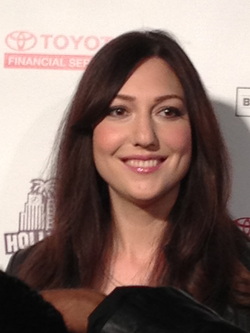 JACQUELINE LAWTON: Why did you decide to get into theatre? Was there someone or a particular show that inspired you? DARIA POLATIN: Discovering Chekhov made me want to be a playwright. Reading his plays I was struck by how his characters had so much emotion and depth – so much lurking below the surface. They felt so human. My first play was an adaptation of a Chekhov short story “The Lady with the Pet Dog.” I had a wonderful teacher at drama school, Jon Lipsky, who encouraged me to write the piece. The play ended up getting produced and published, and that’s what began my career as a playwright. JL: Tell me a little bit about your writing process. Do you have any writing rituals? Do you write in the same place or in different places? DP: I usually write daily during business hours. Right now I have a great office, and I have a few favorite coffee shops I like to go to. I also like libraries. I stay off the internet while I’m writing (or at least try to). JL: Can you tell me about the play that’s being published in Plays for Two? DP: That First Fall is about the first fracture in a friendship between two eighteen-year-old girls, Zoe and Skyler. I wrote it when I was living in Brooklyn. The play was brought to life by Ellen Haun and Martina Bonolis at Actors Theatre of Louisville, and was directed by Lila Neugebauer. JL: What excited you about being a part of this anthology? DP: I thought it’d be great to contribute to a book that lets actors have a wide range of new pieces at their disposal. I'm really pleased to be a part of the collection, alongside such great other writers. JL: What advice do you have for up-and-coming playwrights? DP: Keep writing. Write and write and write, and re-write, re-write, re-write. Read as much as you can, see plays, talk about plays. Seek advice on your work from those who know more than you. Have your work read out loud by actors. Hone your scripts, craft them. Dig deep within yourself and ask yourself how you can make your work better. JL: What’s next for you? Where can we follow your work? DP: I recently finished a new play called IN TANDEM, and am just getting started on a new piece I’m excited about. I’m also working in TV these days so trying to balance my writing time. I keep updates on my website: dariapolatin.com About the PlaywrightDaria Polatin’s plays include In Tandem, Guidance, That First Fall, D.C., and The Luxor Express, inspired by her father’s life growing up in Egypt. Her work has been produced at The Kennedy Center, Actors Theatre of Louisville, Naked Angels, Ensemble Studio Theatre NY, The Wilshire Ebell Theatre in Hollywood, in London and Hong Kong, and at Cape Cod Theatre Project, where her play Guidance was helmed by Broadway director Mark Brokaw. Daria’s most recent one-act play, Laura & Sebastian (and Jordan & Bliss), premiered in Los Angeles and was co-produced by Anonymous Content. Daria wrote and directed the short “Till It Gets Weird,” which she developed for television with Hazy Mills Productions. Daria currently works on the Starz original series “Flesh and Bone.” Daria completed a playwriting residency with London’s Royal Court Theatre, earned her B.F.A. from Boston University, and her M.F.A. in Playwriting from Columbia University. Awards: Kennedy Center/A.C.T.F. Best One-Act Play, Wasserstein Prize Nominee, Princess Grace Award Finalist. Plays published by Dramatists Play Service, Dramatic Publishing Co., and Vintage Books. www.dariapolatin.com About the Anthology
Plays for Two is a unique anthology of twenty-eight terrific plays for two actors, by a mix of celebrated playwrights and cutting-edge new voices. I had the pleasure of speaking with playwright Mark Harvey Levine about his play, The Kiss, his advice on writing, and upcoming work. 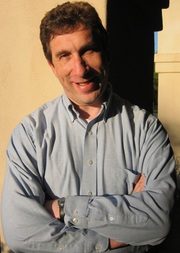 JACQUELINE LAWTON: Why did you decide to get into theatre? Was there someone or a particular show that inspired you? MARK HARVEY LEVINE: I’ve been involved in theatre for a long time -- I started acting when I was 10 or 11. But it was reading the collection “All In The Timing” by David Ives (who also is included in “Plays For Two”) that inspired me to start writing ten minute plays. His plays showed me the endless possibilities that the form allowed. JL: Tell me a little bit about your writing process. Do you have any writing rituals? Do you write in the same place or in different places? MHL: I don’t really have a writing ritual. Unless you count staring at the blank screen and panicking. And waiting until the last minute -- that’s another important part. Plus lots of coffee. I do like to listen to music while I write. If I look up and realize I have no idea what the last ten songs were, I know I’m onto something. Most of my plays come from a “What If” scenario, really. When I find myself asking “What if (blank) were true?”, then I usually get a good idea for a play. JL: Can you tell me about the play that’s being published in Plays for Two? MHL: “The Kiss” is a little bit of a departure for me. Most of my plays have a supernatural element to them, but this one is completely naturalistic. I wanted to write a non-romantic romantic comedy. A romantic comedy where the two characters don’t end up together. Normally I write regular romantic comedies but I was going for something a little bittersweet this time. JL: What excited you about being a part of this anthology? MHL: I love being in these Vintage Anthologies. Eric Lane and Nina Shengold are so nice to work with. They’re incredibly supportive. And it’s an honor to be included with David Ives and so many other great playwrights. Plus these books tend to get around a lot, so they bring in more productions, which never hurts! JL: What advice do you have for up-and-coming playwrights? MHL: First of all, write write write! And then find yourself a good writing group. Preferably one where they’ll read your plays out loud and you can hear them. There’s nothing more instructive than hearing your work read aloud. I’d also advise new playwrights to join a local theatre company. Work the lights, paint sets -- learn everything that goes into putting up a production. And by being part of the local theatre community, you’ll meet actors and directors who can help you get your plays produced. Along with writing, I encourage new playwrights to submit like crazy! Get your work out there! JL: What next for you? Where can we follow your work? MHL: I’m working on trying to get more international productions. This month alone I’ve had productions in Bucharest, Romania and Bangalore, India. And I’m also trying to get more productions of full evenings of my work, like “Didn’t See That Coming”. I’m also teaching a workshop called “How To Write The Ten Minute Play -- And Get It Produced”. I’ve taught it in Los Angeles, Seattle and North Carolina, and I’ll be doing it in Tacoma later this month. You can keep up with me on my website: markharveylevine.com or my Facebook Page. About the PlaywrightMark Harvey Levine has had over 1000 productions of his short plays all over the world from New York to Seoul to London to New Delhi. Evenings of his work have also played in the Edinburgh Fringe Festival, Amsterdam, Sao Paulo (in Portuguese!), Sydney, New York, Los Angeles, Boston, Indianapolis and elsewhere. His work has been translated into Portuguese, French, Hebrew, Japanese, Arabic, Romanian and American Sign Language. He has also appeared in the Vintage Anthologies “Laugh Lines” (with his play “Surprise”) and “Shorter, Faster, Funnier” (with “The Rental”). His work has been seen at such theatres as the Actors Theatre Of Louisville, City Theatre of Miami and the Kennedy Center in Washington, DC. In 2005, the Pausa Companhia of Brazil translated six of Mark's plays into Portuguese and created the evening "Aperitivos". The production played in São Paulo in 2006, and went on a National tour of Brazil from 2007-2010. Some performances were near the Amazon Rainforest in villages with people that had never seen a play before! Mark is a graduate of Carnegie-Mellon University's School of Drama. He currently lives in Pasadena with his lovely wife and son. More info at www.markharveylevine.com. About the Anthology
Plays for Two is a unique anthology of twenty-eight terrific plays for two actors, by a mix of celebrated playwrights and cutting-edge new voices. I had the pleasure of speaking with playwright Jacob Juntunen about his play, Saddam's Lions, the impact Edward Albee had on his playwriting career, and upcoming work. 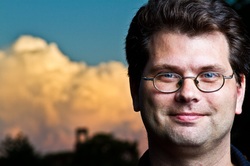 JACQUELINE LAWTON: Why did you decide to get into theatre? Was there someone or a particular show that inspired you? JACOB JUNTUNEN: I always wanted to be a writer, but didn’t consider theatre until I was at Clackamas Community College in my early twenties. Luckily, at that time, CCC had a playwriting class taught by Sue Mach that helped me find my way. I didn’t see my first play until community college, and it was Edward Albee’s The Zoo Story. Jerry’s monologues made me feel like I wasn’t alone, that someone else was as alienated as I felt. When Edward Albee came to CCC, hearing him speak was like a thunderclap, and getting to work with him later in his playwriting classes at the University of Houston sold me on a life in the theatre. JL: Tell me a little bit about your writing process. Do you have any writing rituals? Do you write in the same place or in different places? JJ: I’ve actually tried to avoid rituals as much as possible so I that, in theory, I will be able to write anywhere, no matter the environment. In practice, though, I like to have tea, music, and an external keyboard/mouse for my laptop. The music, actually, is basically essential. Without it, my thoughts are too busy. The music occupies a chunk of my brain so that I can focus the rest of it on the emerging play. Also, when the play is new, I buy a big piece of poster board, write the title across the top of it in sharpie, and tape index cards to it with scene headings on them. I like to have that on the wall while I write, if I can. So it looks like I’ve failed to avoid rituals… JL: Can you tell me about the play that’s being published in Plays for Two? JJ: While I live in Carbondale running SIU’s MFA and PhD programs in playwriting, I consider Chicago my home base. Saddam’s Lions began as a collaboration between me and Chicago’s Vet Arts Project (VAP). Basically, VAP pairs artists of all kinds and veterans from all wars to help the veterans tell their stories. At that time, I was working with an actor friend whose sister had been an MP in Iraq. I interviewed her with her brother in the room, and it was an amazing experience. She shared things about which her brother didn’t know, by the end even talking about the death of her best friend. To see them come together was breathtaking, and I tried to take the transcript from that interview and turn it into a fiction that didn’t lose the truth of that encounter. JL: What excited you about being a part of this anthology? JJ: The most important part of this play, for me, was helping tell a veteran’s story and giving her family members some insight into her experience. I assumed that’s where it would end, that this play was a labor of love and activism. The fact that it’s become my most produced play, and now my first published play, is a real honor because I believe it speaks to the power of political theatre, even in the 21st century. JL: What advice do you have for up-and-coming playwrights? JJ: See theatre, read plays, and write. Consider a funded MFA program (like SIU’s!). You’ve got to always be seeing and reading a ton of plays in order to keep up with the conversation. You need to know the classics; you need to know the scholarly dialogue, to some extent, around the classics so you understand how the canon shifts over time (like when Machinal returned to the canon in the 1990s). You also need to know current new plays, not to compete, but to engage with them. Your writing will be part of the new play ecology, so if you don’t know your surroundings, you’ll be missing a big part of how spectators will receive your plays. Finally, graduate school isn’t necessary for everybody, but it’s worth thinking about. Graduate school provides space to practice your writing deliberately, to give it all your concentration, and be guided by a skilled mentor. JL: What next for you? Where can we follow your work? JJ: There’s lots coming up. On March 25, my ten-minute play See Him? will be part of the Belarus Dream Theatre project in which 18 theatres in 12 countries will present plays meant to call attention to the human rights violations by the government in Belarus. My full-length, Joan’s Laughter, will be done at SIU as part of our annual Big Muddy New Plays Festival April 3-6; Joan’s Laughter will also have a production in Columbus, OH at Shots in the Dark Productions this summer. Finally, and maybe most exciting, on May 12-14 my latest full-length, In the Shadow of his Language, will have a reading in New York, but the producing theatre hasn’t publicly announced it yet. Watch my website for more info as the date gets closer! www.jacobjuntunen.com You can also read short plays I write monthly at: RiposteToTheWorld.blogspot.com About the PlaywrightJacob Juntunen is a playwright and theatre scholar whose work focuses on people struggling against society’s boundaries. He heads the playwriting MFA and PhD at SIU (Southern Illinois University). His latest play, In The Shadow Of His Language (Alliance/Kendeda National Graduate Playwriting Contest Finalist; O’Neill Playwrights Conference Semi-Finalist; Princess Grace Fellowship Semi-Finalist) was read at Chicago Dramatists, as part of Chicago’s Department of Cultural Affairs “In the Works” series, and at the Alliance Theatre. Other plays include Under America, Joan’s Laughter, and Saddam’s Lions (published in Vintage Press’ Plays for Two). His work has been featured in TimeOut Magazine, and developed at the Sewanee Writers’ Conference. He has won Lee Blessing and Tennessee Williams Scholarships, as well as grants from the Illinois Arts Council. Juntunen’s work has been performed at the Alliance Theatre (Atlanta), Barrow Group (NYC), Source Festival (DC), the Vestige Group (Austin), and, in Chicago, at the Side Project, Chicago Dramatists, and others. His scholarship on the politics of performance has appeared in Theatre Journal, Puppetry International, Polish-AngloSaxon Studies, and a variety of anthologies. Additional recognition includes a 2011 Faculty Fulbright Fellowship at Adam Mickiewicz University (Poznań, Poland) and a 2014 Thesaurus Poloniae Senior Scholar Fellowship (Kraków, Poland). About the Anthology
Plays for Two is a unique anthology of twenty-eight terrific plays for two actors, by a mix of celebrated playwrights and cutting-edge new voices. I had the pleasure of speaking with playwright David Ives about his award winning play Venus in Fur, his expert advice on writing, and upcoming work.  JACQUELINE LAWTON: Why did you decide to get into theatre? Was there someone or a particular show that inspired you? DAVID IVES: When I was 17 I went to a matinee of Edward Albee's "A Delicate Balance" at Chicago's Studebaker Theatre. It was the touring company of the original New York production and had the great Hume Cronyn and Jessica Tandy (the original Blanche Dubois) in the leads. I paid $3.65 for a seat in the balcony and up to that point had never been so thrilled in my life. The passion, the eloquence, the profundity, the absurdity, the comedy -- all of it made me think I want to do THAT. So basically my life was changed, my future course decided during two hours of an afternoon several decades ago. And I still want to do THAT. JL: Tell me a little bit about your writing process. Do you have any writing rituals? Do you write in the same place or in different places? DI: I write every day from after breakfast till the middle of the afternoon, then take a walk and listen to people's conversations and think about what I wrote during the morning. If necessary I go back to work in the evening, though that happens less often these days. I work in my writing room, at my table, in stygian darkness -- maybe because early on I did all my writing in the middle of the night. At one apartment I put black wallboard over the window of my writing room to block out daylight. So it is. I can fix but can't write anything new in hotel rooms, the only exception being when I was on my honeymoon and had to write a one-act for an upcoming evening of my short plays in New York. So in a hotel room in Oaxaca, Mexico, while my wife sunned by the pool I wrote, over the course of several mornings, "Time Flies," about two mayflies out on a date. JL: Can you tell me about the play that’s being published in Plays for Two? DI: "Venus In Fur" is a play that has four people onstage though there are only two actors. It's the account of a playwright/director looking for an actress to play in his adaptation of the 19th-century erotic novel "Venus Im Pelz" by Leopold von Sacher-Masoch (who gave his name to masochism). As the playwright and an auditioning actress run through scenes from his play they find themselves.... But that would be giving it all away, wouldn't it. The Times called the play a psychodrama, the French press called it a black comedy. Take your pick. JL: What excited you about being a part of this anthology? DI: It's always fun being in any anthology because it's like milling around on first day of rehearsal with all the cast and personnel. The only exception was when I got included in an anthology and opened the volume in a bookstore to find this as the beginning of my bio: "David Ives (1917-1994) was the head of Boston Public Television..." Some assistant at the publishing house had gone online to find a bio of me and gotten the wrong man. It was a shock to read my own death dates, but I certainly found I was happier as myself than as the head of Boston Public Television. Especially since I was still alive and he wasn't. JL: What advice do you have for up-and-coming playwrights? DI: What other advice can one give? Write. Write some more. Keep writing. Then write some more. After that, write. JL: What next for you? Where can we follow your work? DI: At the moment I'm in rehearsal at Classic Stage Company in New York for a French comedy from 1708 that I translated/adapted. I call it "The Heir Apparent" in English. Over the past few years I've taken to adapting French classical comedies, partly because it gives me a chance to write in verse, than which nothing is more fun. I have another one coming up next season at the Shakespeare Theatre Company in D.C. called "The Metromaniacs," after an unknown French play from 1738 originally titled "La Metromanie." Next season I'll also have a new bill of one-acts at Primary Stages in New York, titled "Lives Of The Saints," combining some older short plays and several new ones. About the PlawwrightDavid Ives is perhaps best known for his evening of one-act plays, All In The Timing (he has been included in the Best Short Plays series seven times), and for his drama Venus In Fur, which was nominated for a Tony Award for Best Play and has been filmed by Roman Polanski. The movie was in competition at the Cannes Film Festival in 2013. David Ives’s plays include New Jerusalem: The Interrogation of Baruch de Spinoza; The School for Lies (adapted from Molière’s The Misanthrope); The Liar (adapted from Corneille); Time Flies; and Is He Dead? (adapted from Mark Twain). A former Guggenheim Fellow in playwriting and a graduate of The Yale School of Drama, he lives in New York City. About the Anthology
Plays for Two is a unique anthology of twenty-eight terrific plays for two actors, by a mix of celebrated playwrights and cutting-edge new voices. I had the pleasure of speaking with playwright Anthony Clarvoe about his play The Art of Sacrifice, his writing process, and exciting new work. 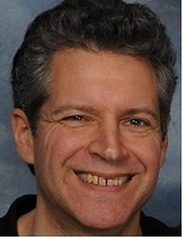 JACQUELINE LAWTON: Why did you decide to get into theatre? Was there someone or a particular show that inspired you? ANTHONY CLARVOE: Several events added up to an irresistible force: a school trip to CYRANO DE BERGERAC at ACT; being commissioned to write the 8th grade play (THE HOUND OF THE BASKERVILLES; I got to play Sherlock Holmes, too); Hal Holbrook making MARK TWAIN TONIGHT a piece of living political and social commentary. I wanted to be part of that highly focused way of being in the world. JL: Tell me a little bit about your writing process. Do you have any writing rituals? Do you write in the same place or in different places? AC: I’m a serial obsessive, and the only way I can justify the book-buying is to turn the obsession into a play. So my place will tend to be covered in books and materials about whatever I’m working on. That tends to mean that wherever I have a desk, that’s not where I write. I’m a native Californian, so I do a lot of writing while driving. I don’t write in a linear way, so at some point I need to print everything, spread it out all over the floor, and walk around on it while I rearrange the pieces and write new ones. Also, coffee. JL: Can you tell me about the play that’s being published in Plays for Two? AC: THE ART OF SACRIFICE was commissioned by the terrific Tim Sanford at Playwrights Horizons. I was obsessed with chess at the time – my older son got curious about it, I decided to teach him better than I had learned it myself, and there we were. He grew out of it and I didn’t. A little dramatic exaggeration, and I wrote a play about the chess champion of the United States and his compulsively driven father. Playwrights Horizons, Primary Stages, and NY Theatre Workshop did wonderful readings. Charles Towers championed the play, producing and directing it at Merrimack Repertory. JL: What excited you about being a part of this anthology? AC: I’ve read and admired Eric and Nina’s anthologies for years. I grew up learning about plays by reading them in collections like these in the public library. There are some terrific writers in this book and I expect to learn a lot by reading it. JL: What advice do you have for up-and-coming playwrights? AC: See plays often and talk about them. Read plays deeply and take them to pieces. Act in plays by other people. Find people you want to connect with through theater. JL: What next for you? Where can we follow your work? AC: A couple of extraordinary theater ensembles have invited me to be a resident guest artist and write plays with them this year. With the Bloomsburg Theatre Ensemble in Pennsylvania, I’m working on a piece about the revolutionary 18th Century scientist and religious thinker Joseph Priestley. With Ragged Wing Ensemble, which is opening a new performance space in downtown Oakland, CA, I’m co-creating an event called REDWOLF. Broadway Play Publishing’s website is a great place to find my published work. Otherwise, the benefit of having an odd name is that I am easily Googled. About the PlaywrightAnthony Clarvoe has received the American Theatre Critics, Will Glickman, Bay Area Theatre Critics, LA Drama Critics, Elliot Norton, and Edgerton New American Play awards; fellowships from the Guggenheim, Irvine, Jerome, and McKnight Foundations, NEA, TCG/Pew Charitable Trusts, and Kennedy Center; commissions from South Coast Rep, Mark Taper Forum, and Playwrights Horizons; and the Berrilla Kerr Award for his contributions to American theater. Productions include Pick Up Ax (South Coast Rep, San Jose Rep), The Living (Denver Center), Let’s Play Two (South Coast Rep), Ambition Facing West (Trinity Rep, Theatreworks), Ctrl+Alt+Delete (San Jose Rep, George St. Playhouse), The Brothers Karamazov (Cincinnati Playhouse, Circle X), Show and Tell (Rep Theatre of St. Louis), and Our Practical Heaven (Aurora Theatre). His plays are published by Broadway Play Publishing, Inc. Anthony is a regular instructor at the Playwrights Foundation, Stagebridge, and Playground. About the Anthology
Plays for Two is a unique anthology of twenty-eight terrific plays for two actors, by a mix of celebrated playwrights and cutting-edge new voices. I had the pleasure of speaking with playwright Pete Barry about his play Hearing Aid, his writing process, and his theater and film company, The Porch Room.  JACQUELINE LAWTON: Why did you decide to get into theatre? Was there someone or a particular show that inspired you? PETE BARRY: I don’t think I knew what I was signing up for. I walked into my high school’s theater auditions (for what ungodly reason I can’t remember) and they asked me to perform a prepared monologue. I only vaguely understood what a “monologue” was. And any of my teachers could have told them I had no idea what “prepared” meant. So I performed all three parts from the Dennis scene from Monty Python and the Holy Grail. I think I shocked them into submission, so they cast me as Durdles the gravedigger in The Mystery of Edwin Drood. It was all downhill from there. JL: Tell me a little bit about your writing process. Do you have any writing rituals? Do you write in the same place or in different places? PB: I’m the stay-at-home-father of young children, which means keeping them from scaling the refrigerator by day and explaining what 2:30 AM means in the middle of the night. So I’ve adapted my writing habits to snatching moments of time here and there, usually before everyone’s awake or after bedtime. There are thousand of pieces of scrap paper with my scribblings all around my house. I haven’t quite mastered writing on my phone while at the playground. JL: Can you tell me about the play that’s being published in Plays for Two? PB: My mother is constantly pitching play ideas to me. They are always terrible. But her mere existence often inspires me. Unfortunately, she’s losing her hearing, which she’s much more good-natured about than the rest of us who are trying to talk to her. This play, Hearing Aid, wrote itself pretty organically. It’s about the frustrations of an older, married couple who can’t hear each other anymore, and so they end up having two totally different conversations at the same time. I also wanted to explore the way couples can talk without actually communicating or understanding each other at all. JL: What excited you about being a part of this anthology? PB: I’m star-struck. When I was in college, David Ives was the tops. You had to do or see at least one of his plays every semester, and I remember falling off my couch laughing while reading Mere Mortals. Now Eric and Nina have put me in a book with him, where my play will flirt inappropriately with Venus in Fur, forever. And that’s not even mentioning the rest of the talent they’ve collected for the anthology. Thank you, Eric and Nina, for allowing me to walk among giants. JL: What advice do you have for up-and-coming playwrights? PB: If you can produce your own work, do it. Wear all the hats you can – actor, director, producer – on whatever scale or budget you can manage. Try short plays; if you can write three to six of them for a small cast without a set, you’ve got an evening of cheap drama that’s relatively easy for a local community theater to produce. JL: What next for you? Where can we follow your work? PB: You can check out the antics of my company, The Porch Room, at www.porchroom.com. About the PlaywrightPete Barry is an award-winning screenwriter, playwright, actor, director and musician. His short plays have been published in numerous collections, including "Accidents Happen" and Eric Lane's anthology "Shorter, Faster, Funnier". His screenplay “10 Crimes in 2 Hours” was a finalist in the 13th Annual Writers Network Screenplay and Fiction Competition. His short play “Drop” was a winner in the 34th Annual Samuel French Off-Off Broadway Festival, and was published by Samuel French in 2010. Other short plays, including “Nine Point Eight Meters Per Second Per Second” and “The Banderscott” have also been selected for performance by Samuel French. He is a cofounder of the Porch Room, a film and theater production company. With the Porch Room he has produced and directed several collections of short plays, including "Five Cornered Thinking" at the New York Comedy Club and "Antony and Cleopatra: Infinite Lives" in the 2013 New York Fringe Festival. A collection including four of his short plays, “Accidents Happen”, won the 2009 NJACT Perry Award for Outstanding Production of an Original Play. Pete lives in the Lehigh Valley, Pennsylvania with his wife Jean and his daughters Lia and Violet. About the Anthology
Plays for Two is a unique anthology of twenty-eight terrific plays for two actors, by a mix of celebrated playwrights and cutting-edge new voices. I had the pleasure of speaking with playwright Billy Aronson about his play Negotiation, his writing process, and upcoming work. 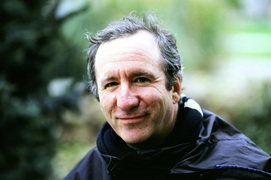 JACQUELINE LAWTON: Why did you decide to get into theatre? Was there someone or a particular show that inspired you? BILLY ARONSON: I started writing plays at 17 because I was in love, and it suddenly felt like all the things you say or do to express feelings weren’t nearly enough. JL: Tell me a little bit about your writing process. Do you have any writing rituals? Do you write in the same place or in different places? BA: When I’m writing I need to move around a lot. Bike riding, running, pacing… JL: Can you tell me about the play that’s being published in Plays for Two? BA: “Negotiation” is about the way you have to package yourself to make a living. I wanted to explode that process as quickly and completely as possible. JL: What excited you about being a part of this anthology? BA: The script has never published before. I’m really excited that lots more people will be able to find it. JL: What advice do you have for up-and-coming playwrights? BA: Be proud of your weirdness. JL: What next for you? Where can we follow your work? BA: I’ve created an animated PBS kids show called Peg + Cat with artist Jennifer Oxley; we’re in the middle of bringing our loopy universe to life. You can follow my work at “billyaronson.com”. About the PlaywrightBilly Aronson’s one-act plays have been produced in 8 Ensemble Studio Theatre Marathons and published in 6 volumes of Best American Short Plays. His full-lengths have premiered at Playwrights Horizons, Woolly Mammoth, Wellfleet Harbor Actors Theatre, SF Productions, and 1812 Productions. His writing for the musical theatre includes the original concept and additional lyrics for the Broadway musical Rent. TV writing credits include Cartoon Network’s Courage the Cowardly Dog, MTV’s Beavis & Butt-head, and Nickelodeon’s The Wonder Pets! (head writer, Emmy Award). With artist Jennifer Oxley he created the new PBS math show Peg + Cat, and their company 9ate7 Productions. With wife Lisa Vogel he created their offspring Jake and Anna. (BillyAronson.com) About the Anthology
When I first learned that, Finals, Touchdowns, and Barrel Kicks, would be included in Eric Lane and Nina Shengold's latest anthology, Plays for Two, I read the email twice and sent it a small handful of friends to make sure that it was real. Then I walked over to my bookshelf and ran my hands over two beloved anthologies that have graced my shelves for more than a decade. The plays included in Plays for Actresses and Leading Women: Plays for Actresses II served as guiding lights of inspiration throughout grad school and even now. It was thrilling to think that my play would be in an anthology that might inspire an emerging woman playwright. Plays for Two is a unique anthology of twenty-eight terrific plays for two actors, by a mix of celebrated playwrights and cutting-edge new voices. Months ago, I had the pleasure to speak with Nina Shengold about her passion for Athol Fugard, her career as an editor, and her experiences as a playwright.  JACQUELINE LAWTON: Why did you decide to get into theatre? Was there someone or a particular show that inspired you? NINA SHENGOLD: My parents took me and my brothers to see plays in New York and London, where my dad taught in the summers, but the bug really bit when I was in high school. I grew up in suburban New Jersey, and used to cut classes and take the commuter bus into New York to see Wednesday matinees. The one that changed my life was Athol Fugard’s Sizwe Banzi Is Dead. In the opening monologue, a photographer (brilliantly played by John Kani), extends his arm to an audience member, inviting them onstage to look at his photos. My $5 Student Rush seat was in the first row, and he chose me. Stepping over the threshold onto a Broadway stage, with this great actor’s hand holding mine, I felt anointed. In my senior year, seven friends and I formed a small theatre company as an independent study project. We did plays by Eugene Ionesco, Tom Stoppard, Samuel Beckett, and Jean-Claude Van Itallie, plus an irreverent kids’ adaptation of Winnie the Pooh, which I wrote. But I didn’t think of myself as a playwright till college, when I took a seminar with Arthur Kopit, a wonderful and inspiring teacher. JL: Plays for Two is your thirteenth anthology. Tell us about how you became an editor. NS: A college acquaintance who worked as a book packager tapped me to edit a monologue book for Viking Penguin. For my second Viking Penguinanthology, I asked Eric Lane to join me as co-editor, and we’ve been working together ever since. JL: What is the process of editing a book? How do you determine the themes? How do you decide which of monologues, scenes and plays will be included? NS: Eric and I try to think of books that will be useful to actors, directors, writers, teachers and people who love to read plays. We’ve been lucky enough to work with the same terrific editor, Diana Secker Tesdell, on all our books at Vintage. We send her a book proposal detailing the book we’d like to create, and if it’s approved, we start soliciting plays that fit the theme (all-female casts, short comedies, plays for two actors etc.) We also do a lot of cold reading, and ask our smart friends for recommendations. One or both of us reads every play that’s submitted. We each create a shortlist of plays we like, and then work together to winnow it down and fill in any gaps. It’s important to us to have a good balance of plays by well-known and emerging playwrights, a variety of tones and styles, roles for minority actors, and other considerations like length and cast size. It’s like putting together a buffet dinner. Pasta salads are great, but you don’t want 18 of them. JL: What do you find most rewarding about being an editor? Do you have a surprising or interesting experience to share? NS: The most rewarding thing, by far, is the electric response when a play really grabs me. This is especially true when I’ve already read hundreds of plays and am starting to gaze at the piles left to read with resentment. No matter how burned-out I am, my heart beats faster when I read a play that excites me. But wise playwrights should note that editors DO get burned out. At the beginning of a reading period, I’m eager to read, and am actively trying to fill empty slots. Weeks and months later, both Eric and I already have more on our shortlists than we can possibly fit in one book, so the script I pick up has got to be different and better to make the cut. Turn your script in before the deadline! More advice from the editor chair: Don’t send more plays than we requested, “just for fun.” Keep your cover letter short, gracious, and to the point. And if you want to stand out in the crowd, don’t send us a ten-minute play about two people meeting in a restaurant or breaking up in an apartment. Not that you can’t write a GREAT first-date-in-restaurant or breakup play, but believe me, you won’t be the first. JL: In addition to your work as an editor, you are also a playwright. Tell me a little bit about your writing process. Do you have any writing rituals? Do you write in the same place or in different places? NS: I have much better work habits when someone has hired me than when I’m writing for myself. A deadline is a girl’s best friend. JL: Describe for me all the sensations you had the first time you had one of your plays produced and you sat in the audience while it was performed ... what was different about the characters you created? How much input did you have in the directing of that work? NS: I was lucky enough to have several productions of my first full-length play Homesteaderswithin two years (at Capital Rep, the Long Wharf, and in LA’s Olympic Arts Festival.) So I got to see very different casts and directors’ approaches bring out different sides of the same set of characters. That elasticity still amazes me. Sometimes you imagine a line or scene in a very particular way, and the actor brings something so different to the table. It’s that volatility that makes playwriting different from any other form of writing. With a screenplay, if you’re lucky, it’ll be produced once. That actor IS that character, forever. With a novel, each reader casts the characters according to her own imagination. But playwrights get to see their creations walking around in different skins. It’s a thrill. JL: What advice do you have for up-and-coming playwrights? NS: Write as much as you can, read as much as you can, see as much as you can, learn as much as you can about every aspect of theatre. The more you know about acting, directing, set design, lighting and everything else that happens on a stage, the better you can write for the medium. Love your own work. Be hard enough on yourself to keep moving forward, but don’t stamp out the spark. There’s a lot of rejection in this business, and it doesn’t mean your work is bad. It means the particular person making a particular choice didn’t choose it this time, for one of a million perfectly valid reasons that aren’t about quality. And don’t take no for an answer. If you’ve written a play you love, find a way to hear it. Get friends together in somebody’s living room to read it aloud, do a staged reading, kickstart a showcase production. JL: What next for you? Where can we follow your work? NS: I just wrote a low-budget screenplay on spec and am trying to finish my second novel between paying jobs. I have a website, www.ninashengold.com, which is sorely in need of updating.
|
My BlogI'm a playwright, dramaturg, and teaching artist. It is here where you'll find my queries and musings on life, theater and the world. My posts advocate for diversity, inclusion, and equity in the American Theatre and updates on my own work. Please enjoy!
Categories
All
Archives
June 2020
Reading List
|
